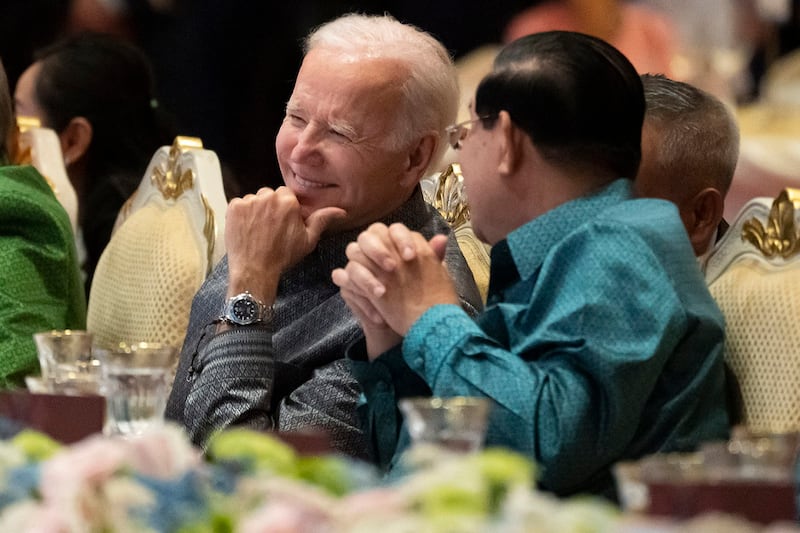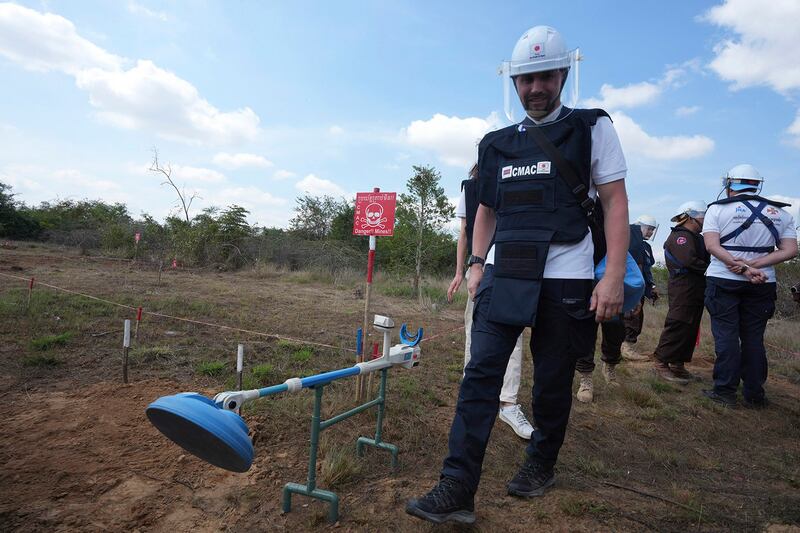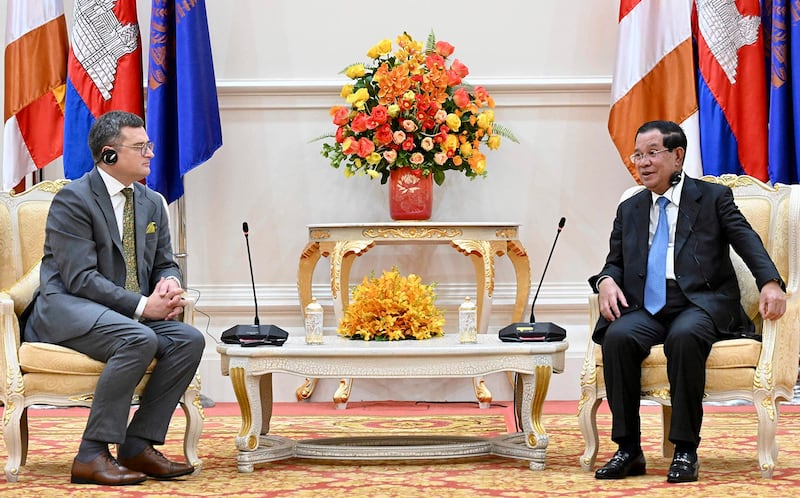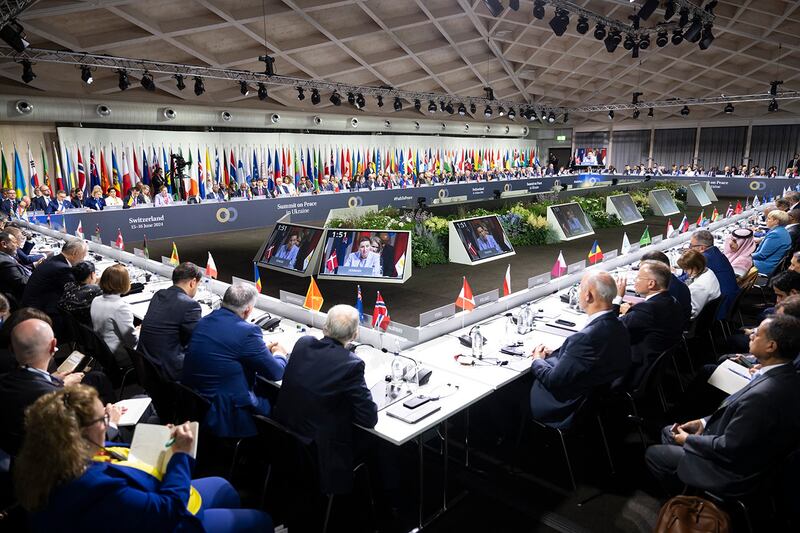Was it a masterstroke of diplomatic opportunism or heartfelt solidarity?
In February 2022, as Russian troops marched into Ukraine, Cambodia’s foreign ministry wanted to take the same approach as most other Southeast Asian countries: say nothing, profess neutrality, make some calls for peace and avoid angering Moscow or Beijing.

But Hun Sen, Cambodia’s prime minister at the time, intervened and instructed his diplomats not only to vote for a UN resolution condemning Russia’s actions but also to co-sponsor it.
Hun Sen said Moscow’s actions “jeopardize the foundation of international order” and openly called the invasion an “act of aggression” that meant Cambodia “cannot remain neutral.”
As 2022 progressed, his stance hardened. In November, Hun Sen spoke to Ukrainian President Volodymyr Zelenskyy by phone and met with Ukraine’s foreign and defense ministers. He offered Cambodian support to train Ukrainian de-miners and take in Ukrainian refugees.
Related stories
[ Putin visits Vietnam, aiming to renew Cold War tiesOpens in new window ]
[ On Ukraine war anniversary, signs that Russia retains some support in regionOpens in new window ]
[ Ukraine invasion 1 year on: Most Southeast Asian countries missing in actionOpens in new window ]
‘Right side of history’
The way Hun Sen and his government – now led by his eldest son, Hun Manet, who inherited the premiership last year – frame this, it was a natural response because Cambodia knows the horrors of foreign occupation and war, supports international law and cherishes peace.
That stance went down well in the West.
When U.S. President Joe Biden visited Phnom Penh in November 2022 for the annual ASEAN Summit, he personally thanked Hun Sen for his response. The Europeans continue to heap praise on Cambodia for being one of the few Southeast Asian states to stand against Russia.
“We appreciate Cambodia’s principled and courageous stance in the face of this full-scale invasion,” European ambassadors to Phnom Penh wrote in a joint letter in February. “Cambodia has positioned itself on the right side of history,” they added.

The timing mattered. Cambodia’s relations with the West had plummeted since 2017, when Hun Sen’s ruling party launched an authoritarian power grab, shutting down civil society and outlawing its only political rival on the spurious charge of plotting a U.S.-backed coup.
The U.S. responded with some tepid sanctions. The EU eventually slashed some of Cambodia’s trade privileges. Military ties were cut. China’s influence grew.
Economically, though, this was a problem: the U.S. and EU were the largest purchasers of Cambodia’s exports, and boosting exports was key to Cambodia’s post-pandemic recovery.
Peace summit no-show
Hun Sen’s support for Ukraine was a diplomatic triumph. For much of 2022 and 2023, whenever a Western official spoke about Cambodia, they always referenced its stance on Ukraine.
It’s not an exaggeration to say that this stance on the Ukraine war was the basis of the baby-step rapprochement between the West and Cambodia since 2022. Indeed, one of the most important steps was Hun Sen’s invitation to visit Paris in December 2022, where he dined with French President Emmanuel Macron.
The formal reason for that visit: Hun Sen's attendance of the “Standing with the Ukrainian People” conference. The actual reason: Hun Sen saw France – Cambodia’s former colonizer desperate for any partnership in Southeast Asia that would help boost its security footprint in the region – as an important interlocutor within the Western alliance.
Despite all of this, Cambodia did not send representatives to the Ukraine-organized Global Peace Summit in Switzerland last weekend.

Some allege that Phnom Penh was instructed to do so by Beijing, whose position on the Ukraine war has become ever more pro-Russian since 2022, despite Chinese professions of neutrality.
Ukrainian President Volodymyr Zelenskyy has claimed China was trying to prevent other countries from participating in the event. Hun Sen denied this, insisting that Cambodia was a no-show because, without Russian participation, the summit would be “unsuccessful.”
However, most Southeast Asian governments sent a delegate to the summit, even though none seriously thought that it would resolve the conflict. All clearly understood it was more of a symbolic meeting.
The exceptions were Cambodia; Myanmar, whose military junta counts Moscow as a rare friend; Vietnam, which was awaiting a visit by Vladimir Putin; and Laos , the only Southeast Asian state to attend a World War II commemoration ceremony in Moscow in May.
Courting Moscow?
Cambodia could have sent a junior official. Every other Southeast Asian country that attended, bar Timor-Leste, sent either a vice-minister or someone even more junior. Indonesia sent an ambassador. Hun Sen personally traveled to Paris in 2022 for the “Standing with the Ukrainian People” conference, a far less weighty gathering than the Global Peace Summit.
Maybe Phnom Penh genuinely felt the summit was a waste of time. Or maybe it sees the need to improve ties with Russia.

On June 6, Hun Sen met with the Russian ambassador to Phnom Penh, Anatoly Borovik. According to reports, the main topic of discussion was new direct flights between Russia and Cambodia. The tourism sector is driving Cambodia’s economic recovery. Cambodia also wants to start exporting more food to Russia, a large importer from Thailand.
Just this week, Gen. Mao Sophan, commander of the Cambodian Army and Hun Sen’s right-hand man, made a three-day visit to Moscow where he committed Cambodia to signing a memorandum of understanding to boost cooperative ties.
Maybe Cambodia believes that it no longer needs to emphasize its solidarity with Ukraine to appease the West. Whereas its stance on Ukraine in 2022 precipitated the first phases of rapprochement, that conflict is no longer an integral part of the discussions.
David Hutt is a research fellow at the Central European Institute of Asian Studies (CEIAS) and the Southeast Asia Columnist at the Diplomat. He writes the Watching Europe In Southeast Asia newsletter. The views expressed here are his own and do not reflect the position of RFA.
